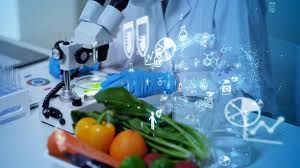When we sit down to enjoy a delicious meal, we rarely consider the intricate science happening within our food. However, biochemistry plays a crucial role in determining the taste, texture, and nutritional composition of the meals we consume. From the moment ingredients are harvested or purchased, biochemistry sets off a chain reaction of processes that transform raw materials into the delectable dishes we savor.
At its core, biochemistry is the study of the chemical processes and reactions occurring within living organisms. In the realm of food, biochemistry investigates how various compounds, such as proteins, carbohydrates, and lipids, interact and change during cooking, processing, and digestion. Understanding the science behind biochemistry in food not only deepens our appreciation for culinary experiences, but also sheds light on how our bodies extract essential nutrients from what we eat.
One key aspect of biochemistry in food is the Maillard reaction. This complex process occurs when heat is applied to foods, resulting in the browning or caramelization of surfaces. Have you ever marveled at the golden crust on freshly baked bread or the delightful color and flavor of a seared steak? These mouthwatering improvements are thanks to the Maillard reaction. As heat causes the reaction between amino acids and reducing sugars, a cascade of chemical reactions produces a spectrum of flavors, aromas, and appealing visual changes.
The role of biochemistry extends beyond adding flavor and aesthetics to food; it also governs the preservation and safety of our consumables. Preservation methods, such as canning and freezing, rely on understanding the biochemical reactions that lead to the growth of spoilage microorganisms and enzymatic degradation. By carefully manipulating temperature, pH levels, and oxygen availability, food scientists and technologists can inhibit or slow down these reactions, ensuring the longevity and safety of our food.
Moreover, biochemistry in food unravels the mysteries of nutrition. Protein, for instance, is essential for growth, tissue repair, and immunity, and its bioavailability depends on how it is treated during cooking. Heat-induced denaturation alters protein structures, making it more digestible by breaking it down into smaller peptides and amino acids. On the other hand, excessive heating can result in the formation of harmful compounds, such as advanced glycation end products (AGEs), which have been linked to various health issues.
Similarly, carbohydrates undergo several biochemical transformations during cooking and processing that influence their nutritional impact. Cooking starchy foods like potatoes or grains gelatinizes their starch, making it easier for our bodies to digest and absorb. This process, known as starch gelatinization, releases the energy we need to fuel our everyday activities. Conversely, excessive processing can lead to an increase in the glycemic index, potentially affecting blood sugar levels.
Understanding the science of biochemistry in food not only enables us to enhance flavors and preserve food, but it also empowers us to make informed choices about our diets. By recognizing how biochemistry impacts the nutritional quality of our meals, we can optimize our food preparation methods and avoid potential hazards associated with excessive processing or harmful compound formation.
Next time you sit down for a meal, take a moment to appreciate the hidden science unfolding in your plate. From the Maillard reaction to the transformation of carbohydrates and proteins, every bite is a testament to the powerful role of biochemistry in food. By delving into this fascinating field, food scientists and researchers continue to unlock the secrets behind how we nourish our bodies, leading to a more sustainable and nutritious future.

